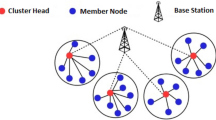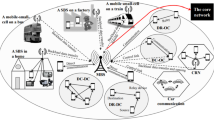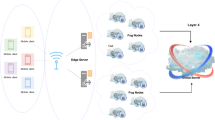Abstract
A distributed mobile DSP system consists of a group of mobile devices with different computing powers. These devices are connected by a wireless network. Parallel processing in the distributed mobile DSP system can provide high computing performance. Due to the fact that most of the mobile devices are battery based, the lifetime of mobile DSP system depends on both the battery behavior and the energy consumption characteristics of tasks. In this paper, we present a systematic system model for task scheduling in mobile DSP system equipped with Dynamic Voltage Scaling (DVS) processors and energy harvesting techniques. We propose the three-phase algorithms to obtain task schedules with shorter total execution time while satisfying the system lifetime constraints. The simulations with randomly generated Directed Acyclic Graphs (DAG) show that our proposed algorithms generate the optimal schedules that can satisfy lifetime constraints.







Similar content being viewed by others
References
Dogan, A., & Ozguner, F. (2002). Matching and scheduling algorithms for minimizing execution time and failure probability of applications in heterogeneous computing. IEEE Transactions on Parallel and Distributed System, 13(3), 308–323.
Hagras, T., & Janecek, J. (2003). A high performance, low complexity algorithm for compile-time job scheduling in homogeneous computing environments. In International conference on parallel processing workshops (pp. 149–155).
Shivle, S., Castain, R., Siegel, H. J., Maciejewski, A. A., Banka, T., Chindam, K., et al. (2004). Static mapping of subtasks in a heterogeneous ad hoc grid environment. In 13th IEEE heterogeneous computing workshop (HCW).
Shivle, S., Siegel, H. J., Maciejewski, A. A., Sugavanam, P., Banka, T., Castain, R., et al. (2006). Static allocation of resources to communicating subtasks in a heterogeneous ad hoc grid environment. Journal of Parallel and Distributed Computing, 66(4), 600–611.
Tian, Y., Ekici, E., & Ozguner, F. (2005). Energy-constrained task mapping and scheduling in wireless sensor networks. In IEEE international conference on mobile adhoc and sensor systems conference (p. 8).
Kumar, P., & Srivastava, M. (2000). Predictive strategies for low-power rtos scheduling. In Proceedings of IEEE international conference on computer design: VLSI in computers and processors (pp. 343–348).
Qiu, M., & Sha, E. (2009). Cost minimization while satisfying hard/soft timing constraints for heterogeneous embedded systems. ACM Transactions on Design Automation of Electronic Systems (TODAES), 14(2), 1–30.
Weiser, M., Welch, B., Demers, A., & Shenker, S. (1996). Scheduling for reduced CPU energy. In: The Springer international series in engineering and computer science (pp. 449–472).
Yao, F., Demers, A., & Shenker, S. (1995). A scheduling model for reduced CPU energy. In Proceedings of the 36th annual symposium on foundations of computer science (FOCS) (Vol. 272, No. 5428/95).
Mosse, D., Aydin, H., Childers, B., & Melhem, R. (2000). Compiler-assisted dynamic power-aware scheduling for real-time applications. In Workshop on compilers and operating systems for low-power (COLP).
Shin, D., Kim, J., & Lee, S. (2001). Intra-task voltage scheduling for low-energy, hard real-time applications. In IEEE design and test of computers (pp. 20–30).
Chandrakasan, A., Gutnik, V., & Xanthopoulos, T. (1996). Data driven signal processing: An approach for energy efficient computing. In Proceedings of the international symposium on low power electronics and design (pp. 347–352).
Pillai, P., & Shin, K. G. (2001). Real-time dynamic voltage scaling for low-power embedded operating systems. In Proceedings of the eighteenth ACM symposium on operating systems principles (p. 102).
Yan, L., Luo, J., & Jha, N. K. (2005). Joint dynamic voltage scaling and adaptive body biasing for heterogeneous distributed real-time embedded systems. IEEE Transactions on Computer-Aided Design of Integrated Circuits and Systems, 24(7), 1030–1041.
Mishra, R., Rastogi, N., Zhu, D., Mosse, D., & Melhem, R. (2003). Energy aware scheduling for distributed real-time systems. In International parallel and distributed processing symposium (pp. 22–26).
Yu, Y., & Prasanna, V. K. (2002). Power-aware resource allocation for independent tasks in heterogeneous real-time systems. In 9th international conference on parallel and distributed systems (pp. 341–348).
Zhang, Y., Hu, X. S., & Chen, D. Z. (2002). Task scheduling and voltage selection for energy minimization. In Proceedings of the 39th conference on design automation (pp. 183–188).
Ishihara, T., & Yasuura, H. (1998). Voltage scheduling problem for dynamically variable voltage processors. In Proceedings of the international symposium on low power electronics and design (pp. 197–202).
Luo, J., Peh, L. S., & Jha, N. (2003). Simultaneous dynamic voltage scaling of processors and communication links in real-time distributed embedded systems. In Proceedings of the conference on design, automation and test in Europe (Vol. 1).
Qiu, M., Yang, L. T., Shao, Z., & Sha, E. H. M. (2009). Rotation scheduling and voltage assignment to minimize energy for SoC. In International conference on computational science and engineering (pp. 48–55). Best Paper Award.
Qiu, M., Jia, Z., Xue, C., Shao, Z., & Sha, E. H. M. (2007). Voltage assignment with guaranteed probability satisfying timing constraint for real-time multiproceesor DSP. The Journal of VLSI Signal Processing, 46(1), 55–73.
Rakhmatov, D., & Vrudhula, S. (2003). Energy management for battery-powered embedded systems. ACM Transactions on Embedded Computing Systems (TECS), 2(3), 277–324.
Panigrahi, D., Chiasserini, C., Dey, S., Rao, R., Raghunathan, A., & Lahiri, K. (2001). Battery life estimation of mobile embedded systems. In Proceedings of the 14th international conference on VLSI design (VLSID).
Ma, C., Zhang, Z., & Yang, Y. (2006). Battery-aware router scheduling in wireless mesh networks. In Proceedings of the 20th IEEE international parallel and distributed processing symposium (IPDPS).
Paradiso, J. A., & Starner, T. (2005). Energy scavenging for mobile and wireless electronics. IEEE Pervasive Computing, 4(1), 18–27.
Yeatman, E. M. (2004). Advances in power sources for wireless sensor nodes. In Int. workshop on wearable and implantable body sensor networks.
Stevens, J. (1999). Optimized thermal design of small ΔT thermoelectric generators. In Proc. 34th intersociety energy conversion eng. conf.
Mitcheson, P. D., Green, T. C., Yeatman, E. M., & Holmes, A. S. (2004). Architectures for vibration-driven micropower generators. Journal of Microelectromechanical Systems, 13(3), 429–440.
Tian, Y., & Ekici, E. (2007). Cross-layer collaborative in-network processing in multihop wireless sensor networks. IEEE Transactions on Mobile Computing, 6(3), 297–310.
Ibarra, O. H., & Kim, C. E. (1977). Heuristic algorithms for scheduling independent tasks on nonidentical processors. Journal of the ACM, 24(2), 280–289.
Kim, S. C., Lee, S., & Hahm, J. (2007). Push–Pull: Deterministic search-based dag scheduling for heterogeneous cluster systems. IEEE Transactions on Parallel and Distributed Systems, 18(11), 1489–1502.
Acknowledgements
This work was supported in part by the NSFC 61071061, the University of Kentucky Start Up Fund; State Key laboratory of Software Development Env. Grant BUAA SKLSDE-2010ZX-13, NSFC 61071061, NSFC 60873241, and 863 Program 2008AA01Z217. 863 Program 2009AA012201; The NSFC 60874050, Program for NCET in University Grant NCET-10-0692, ZPED Z200909334, Zhejiang NSFC R1100234 and Z1090423 FRFCU Grand 2009QNA4012, FAS Grant 20102076002; The NSFC 61070001, RFEB Zhejiang Y200803333 and Y200909683, State Key Lab of High End Server Storage Tech. 2009HSSA10, National Key Lab STASI, SFKPC 2009ZX01039-002-001-04, 2009ZX03001-016, 2009ZX03004-005.
Author information
Authors and Affiliations
Corresponding author
Rights and permissions
About this article
Cite this article
Li, J., Qiu, M., Niu, JW. et al. Three-Phase Algorithms for Task Scheduling in Distributed Mobile DSP System with Lifetime Constraints. J Sign Process Syst 67, 239–253 (2012). https://doi.org/10.1007/s11265-010-0553-y
Received:
Revised:
Accepted:
Published:
Issue Date:
DOI: https://doi.org/10.1007/s11265-010-0553-y




